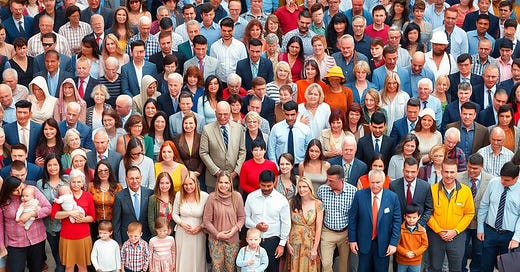Maybe you’re like me and have lost track of the nicknames for various “generations,” the timeframe they include, and what the titles connote.
So here for your information, and just for fun, is a concise list.
Where do you fall on the timeline?
What about your children, friends, and others you know?
Do the stereotypes ring true?
For the record, I’m a Baby Boomer. (And I don’t think I’m materialistic!)
Read on for details.
The Greatest Generation (Born 1901–1927)
Timeframe: Early 20th century to late 1920s.
Characteristics/Stereotype: Endured the Great Depression and fought in World War II; seen as hardworking, patriotic, and resilient, valuing duty and community.
Naming Origin: An earlier usage of the term "The Greatest Generation" is credited to U.S. Army General James Van Fleet in 1953. In a speech to Congress, he described the men of the Eighth Army, which he led during the Korean War, as "the greatest generation of Americans we have ever produced." Journalist Tom Brokaw titled his 1998 book The Greatest Generation and praised their sacrifices. The name gained traction through media coverage and public admiration for wartime heroism, and became widely accepted by the early 2000s.
The Silent Generation (Born 1928–1945)
Timeframe: Late 1920s to mid-1940s.
Characteristics/Stereotype: Grew up during the Depression and World War II; viewed as cautious, conformist, and focused on stability, prioritizing jobs and family.
Naming Origin: Introduced in a 1951 Time magazine article describing the era’s youth as reserved and conformist. Sociologists and media adopted the term in the 1950s to contrast their quiet diligence with louder generations, cementing its use.
Baby Boomers (Born 1946–1964)
Timeframe: Mid-1940s to mid-1960s, post-World War II baby boom.
Characteristics/Stereotype: Experienced prosperity and cultural shifts (such as 1960s counterculture); seen as ambitious, work-focused, and materialistic, often blamed for today’s economic issues.
Naming Origin: Emerged in the late 1940s in media to describe the post-war birth surge. Demographers and marketers popularized “Baby Boomers” in the 1960s, with the media solidifying it as the cohort’s defining label by the 1970s.
Generation X (Born 1965–1980)
Timeframe: Mid-1960s to late 1970s/early 1980s.
Characteristics/Stereotype: Grew up with economic shifts and early tech (such as PCs); independent, skeptical, and adaptable, stereotyped as “slackers” but often entrepreneurial.
Naming Origin: Early uses include a 1964 UK study. Author Douglas Coupland popularized the term in his 1991 novel Generation X: Tales for an Accelerated Culture, capturing their aimless vibe and making it the standard term by the mid-1990s.
Millennials (Generation Y) (Born 1981–1996)
Timeframe: Early 1980s to mid-1990s.
Characteristics/Stereotype: Came of age with the internet and 2008 recession; tech-savvy, idealistic, socially conscious, stereotyped as entitled or social media-obsessed.
Naming Origin: Coined by historians and authors Neil Howe and William Strauss in 1987, preferring “Millennials” for their optimistic, post-Cold War spirit over “Generation Y.” Media and marketers embraced it in the 2000s, with Pew Research standardizing it by 2010, overshadowing the nickname “Gen Y.”
Generation Z (Born 1997–2012)
Timeframe: Late 1990s to early 2010s.
Characteristics/Stereotype: Digital natives raised with smartphones; pragmatic, diverse, activist-minded, focused on mental health and climate, stereotyped as screen-addicted.
Naming Origin: Evolved as “Generation Z” to follow “Y,” with no single coiner easily identifiable. Marketers and researchers popularized it in the early 2010s to describe the post-Millennial, tech-driven cohort, gaining wide acceptance by 2015 through media and surveys.
Generation Alpha (Born 2013–Present)
Timeframe: Early 2010s to mid-2020s (ongoing).
Characteristics/Stereotype: Children of Millennials, immersed in AI and advanced tech; expected to be highly educated, creative, but potentially overstimulated digitally.
Naming Origin: Coined by Australian researcher Mark McCrindle in 2008, using “Alpha” (first Greek letter) to signal a new era. Adopted by global researchers and media in the 2010s as the logical successor to Gen Z, widely used by 2020.
Naming Process: Names for the generations come from various scholars, media, or authors. They gain acceptance through repeated use in books, news articles, marketing, and public discourse. Organizations like Pew Research often standardize the generation ranges and terms.
Acceptance: Media amplification and cultural resonance drive widespread adoption of the name of a generation.
Variations: Birth year ranges may differ slightly but the ones in this article are generally based on Pew Research and common usage in the U.S.
What do you think? Do you fit the stereotypes for your generation?












I think you need to include Generation Jones in your survey (born between 1958-1964). We did NOT come of age until after Watergate, were not part of the chaos NOR the prosperity of the Boomers, were the "feral" children who roamed free without cellphones or GPS.
We were the first generation whose moms had to go back to work in the 1970s due to the economy - thus the term "latchkey kids".
We are cynical, savvy, and frustrated with a government run by 80 years olds who have destroyed our education system, the jobs market, and our kids' futures but still continue to demand, and receive, more!
I believe the Boomers really consist of two sub-groups: Boomers(46’-54’) and Generation Jones(‘55-‘64.)
I would be part of the latter.
However, the stereotypical groupings are troublesome to me because they are used as tools to separate and stigmatize people to serve potentially deadly purposes. Several of my daughter’s acquaintances are drumming up resentment for Boomers using these stereotypes. ( Hello MAID )Also, people exist in a continuum, so such groupings while convenient, are inherently false.
✨The real story here is how past regimes (read NAZI, Stalin, etc.) use stereotypes to eliminate undesirables.